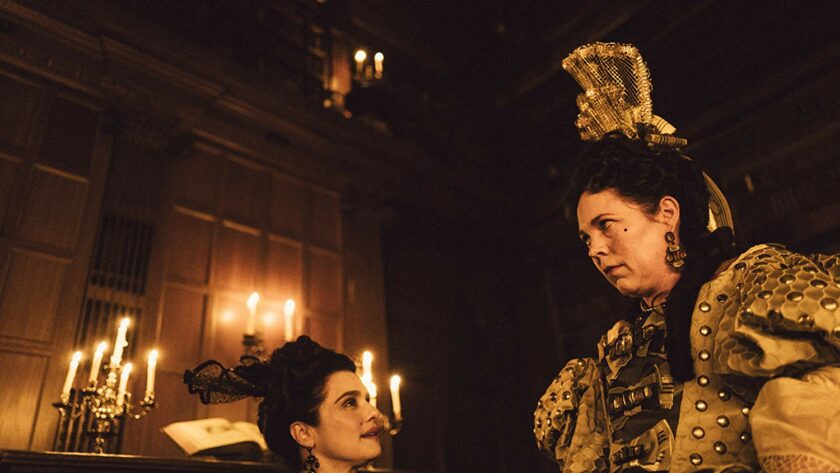It’s festival season! The FilmSoc blog is covering the 75th Venice International Film Festival (29 August – 8 September), diving into the myriad of films and events on offer to deliver reviews.
Milo Garner reviews Yorgos Lanthimos’ latest absurdist comedy.
In a direct sense it would be wrong to say that The Favourite is historically accurate. The characters are largely real and the process of events is not entirely fabricated, but then so much else is, or at best, ruefully assumed. But in another, perhaps more pertinent sense, it is historical, and in a way that many films more fixated on events and dates and costumes are not. It communicates a historical concept, an idea, and does so using the anti-real of cinema for emphasis. Yorgos Lanthimos has never been a realist director, and it is perhaps through his absurd lens that the ludicrous nature of an early modern court – the factionalism, the infirmity of certain monarchs, the impact of personality on state affairs – can truly be understood or presented. The only film I know to consider the court to a similar degree (only with the addition of bookish accuracy) is Roberto Rossellini’s seminal The Taking of Power by Louis XIV, which propagates a contemporaneously-novel theory of how the Sun King exploited and advanced the ceremony of the court in order to establish his personal power base. The Favourite is a sort of inverse, considering how various members of the court and Parliament can slip behind a monarch’s ear for personal or political favour.
But if this suggests some sort of dry explication of historical academia (something Rossellini is wilfully guilty of), let any fears be assuaged – though a little different to Lanthimos’ other outputs, a surreal and sometimes unsettling comedy still awaits. The madness of the court simply allows yet more indulgence, with goose racing and giant dresses in lurid rooms of muted English opulence. Better yet at night, lit by candle and torch, characters illuminated orange against a surrounding black. The Killing of a Sacred Deer might have more impressive shot composition, but The Favourite certainly trumps it in texture – never has a late-night grain seemed so courtly. And if the saturated orange of the evenings might suggest a creeping angst of vying factions, the extreme wide angles used during the daytime fully encompass the off-tilt reality in which they live. We are given only an occasional glimpse at the world beyond the palace; we’re trapped in its circular rhythms.

While Lanthimos’ form is continuously interesting, it is in his leading lady that his film can be truly revelatory. Anyone familiar the golden age of British television comedy in the early 2000s is well aware of Olivia Coleman’s talent, and to see her finally granted such a significant role in a film such as this is gratifying. As Queen Anne, she embodies the contradictions of her character fully and consistently. The most obvious being in the comedic, with a gift for channelling the petulance and childishness of a monarch infirm. But more importantly – and this has often been the case in her television work – it is her dramatic performance that rounds the role. For all the absurdity this film encourages, it is in Anne that a sense of pathos can develop. Her tragedy, her occasional lucidity, the total lunacy of her position and the society that caused it. These things can all be read in Coleman, who only has to drift into a brief melancholy to entirely shift the film’s tone. Some moments are genuinely affecting, even if caught between a sex joke and a ballshot, as is often the case.
It is there that The Favourite occasionally slips. Its comedy is generally effective and a raunchy tone is certainly not undue for a period piece, only that sometimes the dialogue feels out of step with the atmosphere otherwise created. Peter Greenaway attempted a similar schtick but got away with it, as did Michael Winterbottom in his own meta-modern Georgian comedy. In their work, perhaps, it felt a little less like modern zingers given an antiquated brush-over; there are plenty of wonderful insults that can be borrowed from the past, most better than a ye olde ‘you’re cute when you’re angry’. A similar note can be made of a recurring dancing joke, in which modern dance is anachronistically inserted. It was sort of funny, but it doesn’t quite match the comedic tone otherwise struck.

Interestingly for a film otherwise so farcical, it does lay increasing attention to the actual progression of its plot, and largely succeeds in this development. Sarah (Rachel Weisz) and Abigail’s (Emma Stone) ever-escalating power plays are engaging and their dynamic intriguing. Sarah is perhaps the more interesting of the two; initially presented as the more obvious villain, it later becomes clear that, while she is evidently a cruel and exploitative woman, she does, in some twisted way, care for Anne. Abigail has an arc that is initially intriguing – a moral woman forced to contradict her beliefs for self-advancement – but later falters into a rather trite version of absolute power corrupting absolutely. This reflects a general issue in the tail-end of the film overall – as soon as Abigail and Sarah’s rivalry dies down in a direct sense, the narrative fails to find a compelling conclusion other than whatever might be made of Abigail’s ‘fall’, predictable as it is. Anne’s own decline was a little more interesting, but unfortunately largely unexplored.
But if not a triumphant closing (though certainly an adequate one), The Favourite is nonetheless very entertaining in the moment, a well shot and well-paced comedy bookmarked by a slew of strong performances. If it slips in the particulars of comedy or narrative, it does so against an extraordinary background – that rare period piece that totally defies the conditions of its genre and its history to deliver something far more original.
7/10
The Favourite is set for general release in the UK on January 1st, 2019. It will premiere at the BFI London Film Festival on October 18th, 2018. Take a look at the trailer below:




